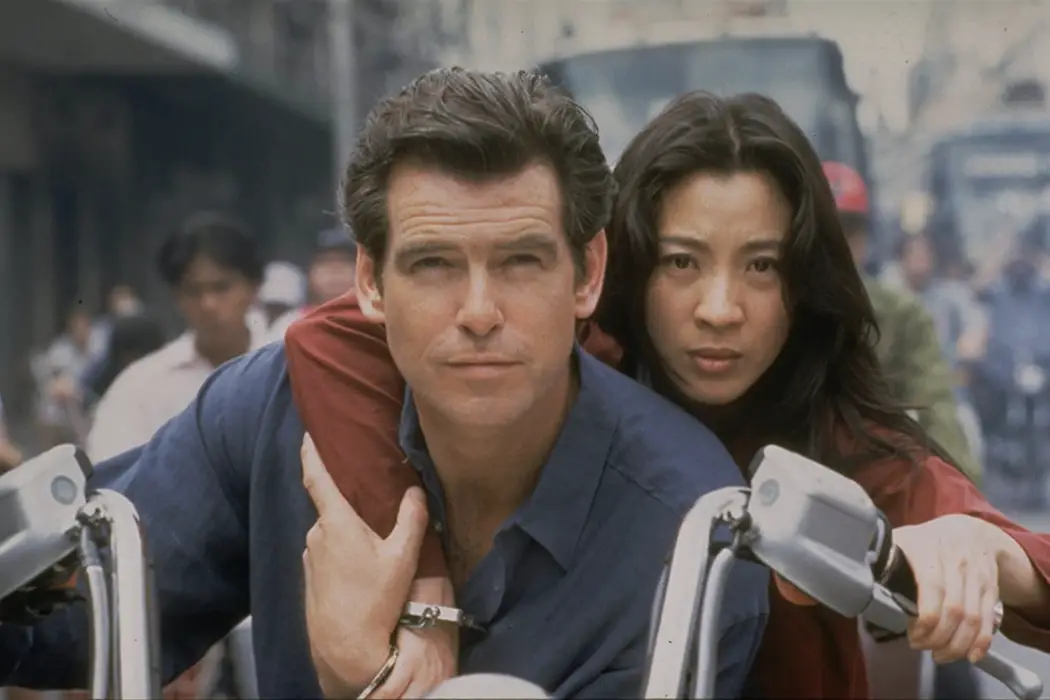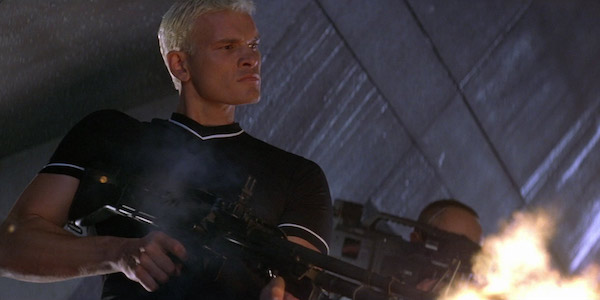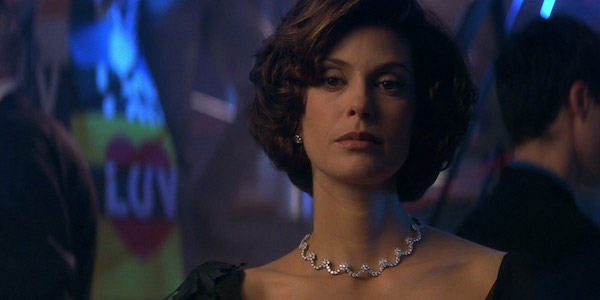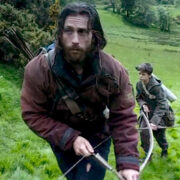NO TIME TO DIE Countdown: TOMORROW NEVER DIES

Movie lover & Los Angeles-based writer. BA in Film Criticism…
In the No Time To Die Countdown, Jake Tropila takes a look back at every Bond film – official and unofficial – in anticipation of the release of the latest entry.
A Bond’s second adventure inevitably begs the question: will it live up to the promise made in the first? In some cases, as in From Russia With Love and Licence to Kill, those dividends pay off exceptionally well. For others, like The Man with the Golden Gun, they stumble and feel like a massive step backwards (poor Lazenby never got a taste of either). Following GoldenEye, which successfully re-contextualized Bond for a post-Cold War era world, where would James Bond to go from there?
As far as Brosnan’s second outing goes, Tomorrow Never Dies is a film I struggle to enjoy. I mentioned in my previous entry that, pound-for-pound, he has the weakest Bond filmography of the lot. I’d pinpoint the dip in quality as starting here. Die Another Day may be more universally reviled, but a lot of my problems with the Brosnan era stem from his sophomore effort (call it whatever you want—guilty pleasure, “so bad it’s good”—I at least have fun watching Die Another Day).

Alas, while it struggles to be good, Tomorrow Never Dies isn’t exactly terrible, either. But therein lies the problem: the film suffers from a complete lack of imagination. Regular readers know I’ve praised the classic Bond efforts and made arguments for others that are not as well-received. But with this one, it just exists on the screen, perfectly content with being perfunctory. Not much here is particularly egregious, but there is nothing remarkable about it, either. Creativity has yielded to formula.
People like what they like, of course, and this entry in the Countdown can absolutely be taken with a grain of salt. Hell, I’m the guy who gave glowing reviews to Diamonds Are Forever and A View to a Kill — just what do I know? If anything, it’s this: when it comes to Bond, being ordinary is a sin, and I’ll delve into why I’m less than enthusiastic about Tomorrow Never Dies (don’t worry, I’ll share some good parts, too). Hop in the back seat of my remote-controlled BMW. It’s 1997. Time to face the media.
Tomorrow’s News Today
The pre-title sequence is the textbook definition of serviceable. We open on A Terrorist Arms Bazaar On The Russian Border, with the entirety of MI6 observing 007 on a mission. After Bond confirms that several of Her Majesty’s Most Wanted are in attendance (including the always welcome Ricky Jay as American techno-terrorist Henry Gupta), the Royal Navy launches a missile on the bazaar with the intent of wiping everything out. But when Bond reveals that one of the planes is armed with two nuclear torpedoes, he immediately enters the fray to steal the aircraft before the Navy’s missile can detonate the nukes.
Very high-stakes stuff, but the tension never reaches its intended level. We’re less than five minutes into the film — are we to believe Bond won’t prevail, even if it’s with something as elevated as nuclear weaponry? Naturally, he does, but not before taking a gunfight on land to an aerial battle in the skies. The unconscious co-pilot sitting behind Bond comes to, and immediately tries to strangle our hero and bring his mission to an end (apologies to Pierce, who seems very much like a nice person, but every time he’s forced to exhibit pain I can’t help but cringe in my chair). Some quick thinking on the eject button sends the foe out of his seat, and nuclear detonation is prevented. MI6 cheers and the Naval officers bit their tongues. Cue credits.
Here’s something I wholeheartedly welcome with both arms: Sheryl Crow’s title song. I always felt like I’m in the minority for not enjoying Tina Turner’s “GoldenEye” as much as others do. Conversely, I feel like Crow’s song gets a bad rap, but it’s all good to me — the bold mix of scintillating strings, booming timpani drums, and Crow’s sultry vocals literally make this music to my ears. Bonus points for the x-ray imagery used in the title sequence, which is neatly animated.

Actually, music has largely improved over GoldenEye. New composer David Arnold, who would hold the job for four more films, channels his best Monty Norman and delivers good stuff throughout his tenure. John Barry remains unimpeachable, but Arnold might be a lock for second best, and is responsible for emulating one of the classic aspects of Bond with huge success. It’s great to hear Bond sound like Bond again.
Following the title sequence, we meet the nefarious Elliot Carver, played with scene-devouring abandon by Jonathan Pryce. Casting a well-known name as a Bond Villain is nothing new (in fact, a lot of Bond Villains come from recent Oscar wins – Christopher Walken, Javier Bardem, Christopher Waltz, and the upcoming Rami Malek, to name a few), and it’s expected to see the actor to play fast and loose with the material. But Pryce is all wrong in the role, playing to the stratosphere with his obnoxious take on Rupert Murdoch.
This would not be so bad if his ultimate plot weren’t so grounded and reflected real-world issues (for all its problems, Tomorrow Never Dies is surprisingly prescient in that regard). As the head of Carver Media Group Network, our Villain desires to be number one on every news outlet possible, even if it means engineering crises to beat his rival networks to the punch. This includes covertly sending an HMS ship off course into Chinese waters, where it is ambushed and destroyed by Carver’s men in hopes of igniting a war between China and Britain.

If Carver’s the brains behind the operation, then henchman Stamper is the brawn. Big, bad, and German, the fourth iteration of hulking blonde Red Grant does a lot of Tomorrow Never Dies’ heavy lifting, including, you guessed it, machine-gunning unarmed innocents. He’s also the rare baddy who provides more than a physical match for Bond, who must rely on his wits to defeat him (much like Jaws). The character is incredibly one-note, but actor Gotz Otto plays that note well.
Of course, the biggest flaw in Carver’s plan is the plan itself. News of the HMS Devonshire’s sinking in Chinese-occupied waters is broken by Carver’s newsgroup, well before the Chinese government can produce a statement. How would nobody find this to be suspicious? In fact, nobody seems to suspect anything except for MI6, who dispatch Bond to Hamburg to investigate. How handy.
The introduction of Paris Carver is one of the film’s grandest missteps. As Carver’s wife and Bond’s ex-lover, she’s established as a figure with the gravitas of Tracy Bond, an emotional center from Bond’s past that he has since lost and must painfully rediscover. A noble idea, but it falls completely flat upon execution. Bond and Paris do not feel like long-lost lovers; there’s no spark between the two, aided in no part by the fact that Teri Hatcher shares absolutely no chemistry with Brosnan. The image of Bond silently waiting in his hotel room, gun in hand, and downing shots of Smirnoff, gives Brosnan the rare opportunity to look über cool (the image is straight out of Connery), but when Paris shows up the coolness deflates. A missed opportunity.
Always The Cunning Linguist
If Tomorrow Never Dies sounds like a drag, rest assured that there’s a setpiece every fifteen minutes to keep the audience engaged (you could practically set your OMEGA Seamaster to it). The next one arrives at Carver’s lab, which Bond infiltrates to steal the device used to send the British ship off course. He also bumps into Wai Lin, whom he met the night previously at Carver’s soiree.
Wai Lin has all the makings of a classic Bond Girl: she can kick ass, has her own host of gadgets, and essentially operates as the Chinese counterpart to Bond’s agent (a la XXX from The Spy Who Loved Me). But the character quite comes alive on screen; despite Michelle Yeoh’s efforts, she struggles to elevate the mediocre film she’s in. To make matters worse, she’s reduced to a damsel in distress in the film’s final moments, despite previous evidence to the contrary.
A lot of my gripes with Tomorrow Never Dies can be traced back to Roger Spottiswoode. The director of such hits as Turner & Hooch and Stop! Or My Mom Will Shoot, Spottiswoode is hardly an inspired choice to helm a Bond feature and his inexperience with some of this large-scale and action-oriented shows. Tomorrow Never Dies features some of the worst editing in any Bond film, with each action setpiece reduced to a blizzard of cuts to disguise directorial incompetence and intimate excitement that otherwise doesn’t exist.

For a film with a lot of action, this hampers the overall experience. And for every scene with bad action, they are punctuated with bad one-liners. For instance, while fighting a henchman at Carver’s newspaper factory, Bond tosses the foe into an operational machine, which grinds him up and starts producing blood-stained newspapers on the assembly line. Bond’s response: “They’ll print anything these days.” Ho ho.
The film’s best scene belongs to Dr. Kaufman. A professional hitman and German sadist, Vincent Schiavelli’s performance is all “ja zis” and “und zat,” but he provides a palpable sense of menace not found anywhere else in the film. Tomorrow Never Dies could have used more of him. The Kaufman scene segues into the parking garage scene, where Bond operates his vehicle from the backseat using a remote control Q gave him. Each gadget on the car is set up to undermine each enemy threat. Bad guys use their vehicles to create a road block for Bond? Bond blows them away with his front-firing missiles. Bad guys give pursuit in their own vehicles? Bond impedes their progress with mini caltrops. Bad guys set up a steel cable that is roughly hood ornament height in a last-ditch effort to stop Bond for good? Bond activates his hood ornament buzz saw to cut right past the threat. You get the idea.
Using the stolen encoder, Bond discovers that the Devnoshire actually sank somewhere off the coast of Vietnam, prompting a HALO jump to penetrate radar cover and find the sunken ship (we’re treated to a brief appearance by CIA agent Jack “Buddha Bless!” Wade, who provides a salient point about America’s involvement in this whole “turkey shoot”: “We have no interest in seeing World War III, unless we start it!”). As plot contrivances would have it, Wai Lin is already in the water, and they are almost immediately captured by Stamper, who bring the two back to Carver’s office in Saigon. Everything keeps moving forward, no matter how nonsensical.

The subsequent escape from Carver’s building (“I’d say he’s developed an edifice complex!”) should be more thrilling than it actually is. Admittedly, there is a halfway clever twist – Bond and Wai Lin are chained together and must work in tandem to overcome their handicap and operate a motorcycle. The helicopter chase is clearly this film’s reaction to the tank chase from GoldenEye, but while that felt propulsive and glorious destructive, this feels almost stilted and too pre-configured (you can clearly see the “routes” the motorcycle must take while on the rooftops. Extra demerits go to the obvious dummies in the kill shot, but I do have to commend the practical effects work on display; we’ve lost a lot in our movies once we transitioned to largely weightless, CGI-laden setpieces. What I wouldn’t give to go back.
The finale of Tomorrow Never Dies takes place on Carver’s stealth ship, as Bond dual-wields a Walter P99 and a machine gun to stop the maniac from bombing Beijing and garnering “exclusive broadcasting rights in China for the next one hundred years” (ugh). Bond has committed to a “storm the tower” ending before, but he’s a next-level superhero here gunning down endless waves of Carver’s men before obliterating the madman himself with his deadly sea drill. Stamper pops up for a final threat, but Bond capably locks him to the rocket intended for Beijing and escapes with Wai Lin. All is well.
(Going back to my earlier comment about this film having good music: KD Lang’s “Surrender,” which plays over the end credits, absolutely rules.)
Conclusion: Tomorrow Never Dies
Watching Bond films is a favorite pastime of mine. Despite my disappointment every now and again, I always find that I keep returning to the franchise more than any other. These films are cinematic comfort food for me, even if they aren’t always up to par with some of the series’ classics. Some are destined to be better than others; c’est la vie. Tomorrow Never Die has its moments, but the film ultimately suffers from a lack of imagination, hastily going through the Bond motions without ever leaving much of an impact. If I had to place any film at the bottom of a ranked list of the franchise, I’d have no trouble making it this one.
Coming up next: Bond takes on a man who cannot feel pain. The No Time To Die Countdown will return with The World is Not Enough.
Where do you stand? Is Tomorrow Never Dies one of the stronger or weaker Brosnan efforts? Let us know in the comments below.
Watch Tomorrow Never Dies
Does content like this matter to you?
Become a Member and support film journalism. Unlock access to all of Film Inquiry`s great articles. Join a community of like-minded readers who are passionate about cinema - get access to our private members Network, give back to independent filmmakers, and more.
Movie lover & Los Angeles-based writer. BA in Film Criticism & Media Theory from CSU Northridge. Unofficial Bond ally. Rhymes with “tequila.”












